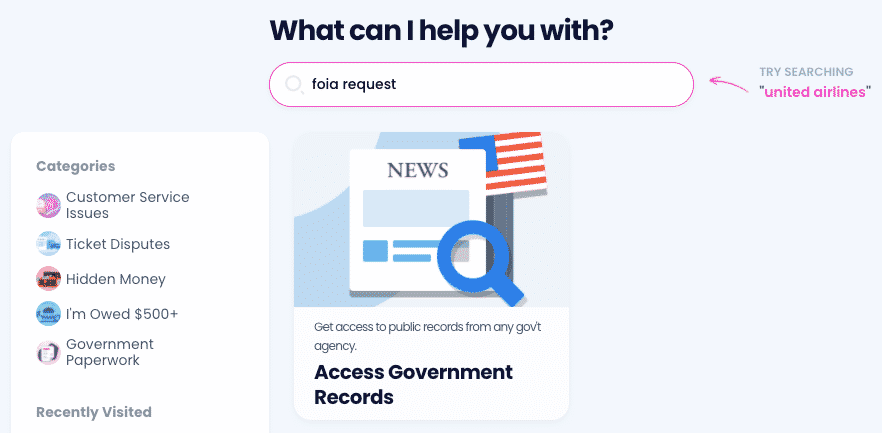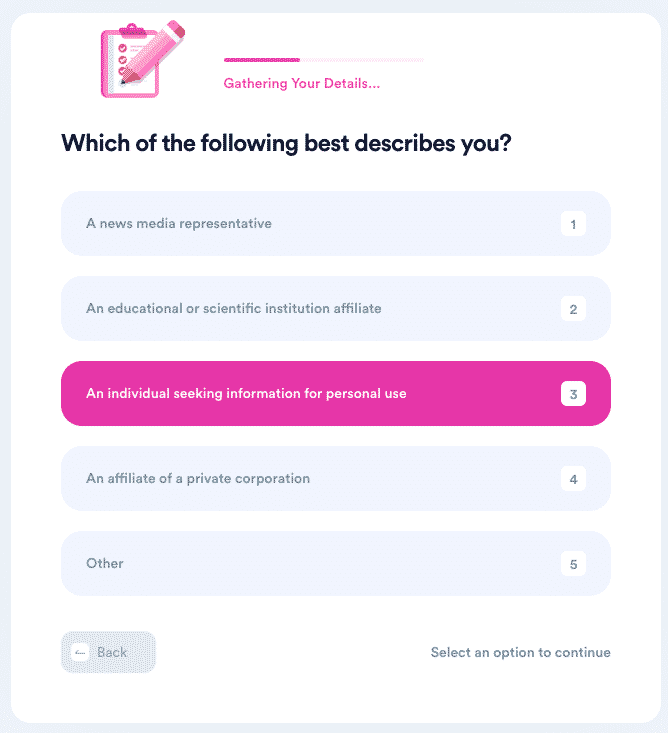Send an Illinois Freedom of Information Act Request in a Snap
The Freedom of Information Act (FOIA) is a law that allows citizens to access federal agency records upon request. It’s a regulation dating from 1966 that gave rise to state freedom of information laws that regulate access to local government records.
Besides explaining the meaning of the FOIA, this article will focus on sharing great tips for filing a FOIA request on yourself or someone else via DoNotPay. Our learning base can assist you in finding out more about checking your request status, appealing unsuccessful FOIA requests, and much more!
Are There Any Exemptions to the Illinois FOIA?
All federal institutions in Illinois will disclose any records except for the ones covered by several exemptions. Here are the items that belong to that group:
- Records related to administrative proceedings
- Trade secrets and commercial and financial information
- Files collected by one or multiple law enforcement agencies
- Information that could bring someone’s privacy into question
- Information prohibited from disclosure according to state or federal law
- Records that may affect the security of detention centers or correctional institutions
- Preliminary notes, drafts, letters, and communications in which any opinions are expressed
What Are the Costs of Filing the Illinois FOIA Request?
All the institutions that provide access to public records in Illinois have the right to charge you for reproducing or certifying the demanded records. There are no standard rates—the fees vary from agency to agency, and most institutions provide a table with current rates on their official website. Search time isn’t included in the fees.
What Information Do You Need To Include in Your Illinois FOIA Request?
Regardless of the institution you choose to send your request to, your FOIA request letter needs to contain the following information:
- First and last name
- Residence address
- Email address and phone number—if you miss these, the agency will have trouble trying to contact you
- Clear and detailed description of the data you want to receive, including all the details you can find—document names, authors, or subjects
- Statement that confirms you are requesting the information under the Illinois FOIA
- Statements that you are a commercial requester or that you are requesting information free of charge or with a reduced charge, if applicable
How To Submit an Illinois FOIA Request on Your Own
None of the agencies that hold public records in Illinois accept phone requests. You can submit only written or in-person petitions, as that’s the only way to specify what type of records you want. Not all institutions have a ready FOIA request form or a FOIA request template you can complete, and in most cases, you need to write a petition letter on your own.
Each agency has its specific rules regarding the request methods. The best way to find relevant information is to check out the website of a particular agency that keeps the desired records. Their FOIA web pages usually include the contact details you can use to submit your petition.
Use DoNotPay To Send Your Illinois Freedom of Information Act Request Fast
In most cases, getting the desired records involves tiresome procedures and a lot of paperwork. The process gets even more complicated when you need to send requests to multiple institutions, which creates an even bigger mess.

DoNotPay provides a great service that allows you to file a regular or expedited FOIA request in record time. You only need to provide the answers to our chatbot’s questions, and we will take care of the rest!
Here’s how you can use DoNotPay to send your FOIA request:
- Open DoNotPay in your preferred and find the FOIA feature
- Specify whether you are sending a request to a state or federal agency
- Provide the name of the institution and the names of the records you are requesting
- Pick additional benefits, such as fee waivers or expedited processing

Once you complete these easy steps, our app will create a request letter and mail it to the agency in question. You can repeat the procedure as many times as you wish and get the desired public records in no time!
Submit FOIA Requests to Any Institution With DoNotPay
The services provides can help you file a request to any agency, including:
- Internal Revenue Service (IRS)
- Central Intelligence Agency (CIA)
- Federal Bureau of Investigation (FBI)
- U.S. Food and Drug Administration (FDA)
- U.S. Customs and Border Protection (CBP)
- Executive Office for Immigration Review (EOIR)
- Office of Biometric Identity Management (OBIM)
- U.S. Securities and Exchange Commission (SEC)
- U.S. Immigration and Customs Enforcement (ICE)
- U.S. Citizenship and Immigration Services (USCIS)
- U.S. Department of Housing and Urban Development (HUD)
Our handy guides will help you find all the necessary information about submitting FOIA requests in any U.S. state, including Ohio, Texas, Florida, Indiana, Michigan, Arkansas, California, and many more.
Discovering DoNotPay Will Make Your Day
If you feel overwhelmed by tons of paperwork flooding every area of your life, you can finally breathe out and let go of that stress. DoNotPay is the world’s first AI Consumer Champion that handles your bureaucratic chores for you.
Some of the benefits that come with our service include:
- Quick fixes for your credit card issues
- DMV appointments scheduled with no fuss
- Extensions for due dates on your bills
- Foolproof methods for stopping robocalls, scam texts, and phishing emails
- Practice tests for various government exams
- Custom-made DMCA notices
- Unlimited burner numbers
- Thorough guidance through small claims court lawsuits
Why Get a Lawyer When You Have DoNotPay?
Our agenda has one major goal—provide easy access to anyone who needs it. Every new feature we come up with relies on AI technology that simplifies bureaucratic procedures and saves you time and money.
If you’re wondering how to navigate tasks like contacting imprisoned friends and family members or reducing your property taxes, DoNotPay has the answers. Our service cuts through the red tape even if you need to deal with stalking and harassment, claim forgotten assets the proper way, or secure compensation for crime victims.


